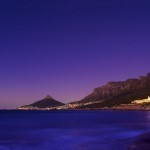Sarah Kingdom dines at De Tafel, where wild-foraged ingredients meet modern South African elegance, in a multi-course experience that’s quietly sophisticated, deeply seasonal, and rooted in the unique Cape Town landscape.
Tucked away in the leafy suburb of Wynberg, De Tafel is one of Cape Town’s truly original dining experiences. You’ll find the restaurant behind the tall gates of the Palm House Boutique Hotel, a stately Edwardian manor, surrounded by old oak trees and lush gardens. But the real magic happens in the kitchen, or rather, long before that, on the mountain or at the coast.

Chef Gregory Henderson, known also as The Forage Chef, doesn’t begin his day with a prep list. He often starts it with a walk.
On a brisk Cape morning, I joined Henderson on one of these walks, up the slopes of Table Mountain. We didn’t get far before he stopped to pluck ‘feral’ or wild fennel (Foeniculum vulgare) from a patch of scrub. “Smell this,” he said, crushing the fronds gently in his fingers. It was fresh and slightly sweet, with hints of liquorice. Later that evening, it would turn up, reimagined, on my plate at De Tafel, served alongside sea lettuce and scallops in a dish that brought the wild straight to the table.
Henderson isn’t just a chef. He’s a conservationist, an award-winning culinary educator, and one of South Africa’s leading voices in indigenous and sustainable food. His passion for foraging began in childhood and has taken him across the continent, learning from local communities and documenting wild food traditions. He’s published books, launched The Wild Food Revolution, created a Biodiversity Academy, and still somehow finds time to run the kitchen here. And what a kitchen it is.


De Tafel is small and serves dinner from Wednesday to Sunday. Guests can choose from four–course, six-course or eight-course tasting menus, all firmly in step with the seasons and with vegetarian and plant-based options available. Wine pairings come courtesy of sommelier Richard Goza and are focused on boutique South African labels.
On arrival, we’re welcomed into an atmospheric drawing room, complete with a crackling fire. The choice of a signature cocktail or glass of MCC sets the tone, accompanied by warm bread and flavoured butters – wild rosemary, honey, or bokkom and truffle (bokkom is salted and wind-dried mullet, a traditional food from the West Coast of South Africa).
Next, we’re ushered into the dining room, with each course that follows being introduced by our waiter or sometimes Greg himself, who describes not just the dish, but where it came from, literally. The menu is seasonal, and shifts slightly with what’s foraged, but highlights during my visit included:

Saldanha Bay oysters topped with smoked mayo, buchu gremolata (buchu is a native South African herb, whose leaves were used in traditional Khoisan medicine), and bokkoms. The dish was deliciously briny, creamy, and sharply herbal.
Next came a sewejaartjie salad with beet petals, sweet potato terrine, olive bubbles, and kapokbos (wild rosemary). Sewejaartjie is a hardy succulent endemic to the Cape, and the resulting salad was floral, earthy, and elegantly plated.
Scallop and sea lettuce, with a light and airy wild fennel espuma and pelargonium oil, followed. A seriously standout dish. And then a slow-cooked duck breast with roasted beetroot, parsnip, and seaweed candy. The Bioclimate dessert was a showstopper, with a fynbos honey panna cotta, honey buchu crème glacée, melon, pollen, and a shard of crisp nut brittle. Greg Henderson’s food tells a story – about the mountain, the coast, and the people who once survived on what they could harvest from both.


Henderson doesn’t just forage for ingredients, he forages for meaning. He talks about sustainability and food security with passion, not simply as buzzwords, but as lived experience. His menus are built around indigenous knowledge, with many of his ingredients, such as bladdernuts (also known as Swartbas or wild coffee), veldkool (a seasonal herb resembling asparagus, with edible flower buds), and wild garlic, being unfamiliar even to locals.
De Tafel is not for those in a rush. Dinner is unhurried, deliberately paced. The space is elegant without being fussy, the service is informed without being intrusive, and while there’s a certain amount of theatre to the presentation, there’s also a humility behind the scenes. The food is undoubtedly fine dining, but it never loses touch with its roots, quite literally.
Cape Town is full of good restaurants, but few offer the kind of grounded, place-based experience you’ll find at De Tafel. This is slow food, wild food, and smart food, served with warmth and intention. Whether you’re a visitor wanting to taste the Cape’s botanical richness or a local looking for a meaningful meal, De Tafel should be on your list.
Tell Me More About De Tafel in Cape Town
De Tafel. Palm House Boutique Hotel, 10 Oxford Street, Wynberg, Cape Town
T: +27217455008 El: restaurantreservations@palmhouse.co.za
Opening hours: Dinner Wednesday–Sunday (18:00–21:30)
Price: MENU PRICING PER PERSON
4 Course – £22/$33, 6 Course – £31/$42, 8 Course – £39/$53
Wine Pairing (optional): £4/$5.50 per course






